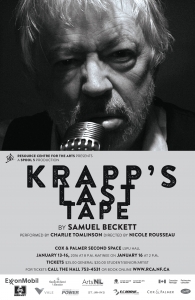 Buy Tickets
Buy Tickets
Duration: 1 hour
Check out our Hall Pass for a way to see this show and more, for less.
Presented by the Resource Centre for the Arts
A Spool 5 production
By Samuel Beckett
Performed by Charlie Tomlinson
Each year on his birthday, Krapp takes out a tape he has recorded on a previous birthday to examine his former self and makes a new tape about the direction his life is taking.
A Spool 5 production, the play was written by the legendary Irish Nobel Prize winner Samuel Beckett and features our own man of many legends, Charlie Tomlinson. We managed to rope him into a short interview about the project, his fellow crew, and the impact Beckett’s work and this role in particular have had on his own outlook:
RCA: You have always had a strong connection with the Resource Centre for the Arts and especially the LSPU Hall. We would love to hear about a project or memory here at the Hall of which you’re particularly fond.
CT: When I am away, and I am working on a new show that may never see Newfoundland, I think of this place, the Hall, the stage upstairs. I picture in my mind’s eye how it looks on that stage, how it looks to the audience. I’ve a place I always try to sit at the Hall, on the right-hand side toward the back, and I sit there in my mind and see this new project unfold. Every time. You ask about memories, Jesus, examples? Downstairs, here at the Hall? Frank Barry in A Gentle Creature, Justin Simms with Infinity Plays. Lori Clarke and all her crowd doing Flood, raucous AGM’s for the RCA back in the day. Rick Mercer, Andrew Younghusband, Christine Taylor and Ashley Billard doing Cory and Wade’s Playhouse shows… pretty endless…
A sleepover with Andy Jones and others here in what’s now the Cox & Palmer Second Space, to catch a theif that plagued the Hall in those days, and the fundraiser that was held here for the Fleming Street Fifteen to cover legal fees.
Everyone’s got a personal mythology – the memories, events and notions that make up your version of who you are, and this place is a huge part of my own. How much time did I spend as a director lying on the floor learning how to not shout at actors? So many friends made, epiphanies had, love found heading down those stairs, and stories not repeatable.
RCA: What is it about Samuel Beckett’s work that speaks to you as a performer, an artist or even a director?
CT: Firstly I don’t think of myself as an artist, a director I suppose, but the term I would apply is theatre practitioner. There are artists of course, Sam Beckett is an artist. Samuel Beckett, I don’t suppose he’d much care for being called Sam, at least by me. He was a brilliant artist. I have no doubt that wherever he is now, in that room next to this, he and Shakespeare share a common nod of respect. They may not eat at the same restaurants, or see the same shows, but there’s a mutual respect. There would have to be.
Beckett is a humbling artist. As one gets older there’s a desire – a necessity – to do things exactly. And Beckett’s work demands exactness. What I’m referring to is the precision of the language. One must take special care with a Beckett line. One must take care to look everything up again to understand the nuances of the word, its various flavours. Even still, there is a particular line in the play, I won’t say what it is, that I quite honestly do not know how to say. It’s a very simple line, and quite obviously an important one, but it utterly baffles me.
A friend of mine speaks of having to put in your hours, of punching in your time with something – particularly with a passion – before you can be good at it; and it’s good for me to be putting in these hours with Beckett. He makes you a student again. It’s a good thing. Beckett is humbling – not abasing, just a reminder that you don’t know it all.
RCA: Nicole Rousseau is directing you in this rendition under the company Spool 5 Productions. Tell us about your friendship with Nicole and with the rest of your crew?
CT: Working with Nicole is very good. We’ve known each other for a long time but I think we’re both still surprised by the partnership, but it’s a good one. I find it very difficult to find collaborators, so I’m very grateful.
It comes down to her being a marvellous listener, I’m not nearly as good at it as Nicole. This play especially makes that valuable. I personally don’t act much anymore because I find it too difficult, it’s much harder than directing.
Brian Kenny is doing the sound for this production and he’s also very good. A newer hand – I don’t mean inexperienced – merely, fresher. So in a way there’s three generations of theatre practitioners working on this. Myself, a veteran of sorts; Nicole, who’s somewhere in the middle; and Brian, the fresh face, full of talent and the enthusiasm to use it.
RCA: The character of Krapp seems like a difficult one to enter the headspace of without coming away a little affected. Could you tell us how you prepared for the role?
CT: The character is fascinating to me. You see so much of
Krapp’s Last Tape is – must – be in the moment. Think of your life as a series of links forming a chain. Each link a moment. You can only be in a single link at a time before you move on to the next entirely different link. They are informed by each link that came before it, certainly, but in order to progress in life you must leave behind those past links. In
Krapp’s Last Tape, we have a kind of simultaneous retrospective of a few key links in a life.
It becomes a real meditation on the question of whether or not a life lived alone is a life worth having lived. That question is important, to an actor, because so much of acting is precisely measuring the amount of yourself that you share with the material you are performing and with the audience whom you are performing it for. I suppose these links of your life also invent your personal mythology. By looking back across these tapes with Krapp, it’s like a veil is lifted for audiences to see the mechanism of Krapp’s own personal mythology. And perhaps what we see is that life is meant to be shared. It’s meant to be out in the sun, not hidden away in a dusty closet or a rickety tape recorder.
Being able to look back on a younger self like that and think bah! What a fool he was! I think we can all relate to that. One can assume that a younger Krapp, did not believe in a thing called society, only in the power of individual genius; but by the end it is apparent that Krapp learned the value of society – I think so anyway – that he sees now in his own twilight that society does in fact exist and that without it he has become less, more a creature than a man. Whatever I mean by that…
RCA: When staging a play by someone as influential as Samuel Beckett, are there restriction to how it can be presented? How did you and Nicole work to lend the current production its own flavour?
CT: I’ve already mentioned that the licencing body for Beckett’s work demands certain stipulations in the staging and blocking of a handful of elements in the script, but ultimately there is still an incredible amount of freedom in Beckett’s work. Freedom for the actor and director to explore the contours of each character and situation in new ways each time. Like any good writing, you never really get to the bottom of it.
Krapp’s Last Tape features only one actor, it’s true, but it is by no means a one-man show. You see a person listening to a younger person talking about a person yet younger again. The audience watches and listens to each presence behold, dissect and turn over the thoughts and actions of each preceding link of the chain.
Beyond that even, there lies at the heart of it all yet another. At least I hope, I pray, I need to believe that there is another presence, or maybe that’s too strong a notion, the loss of an Other, certainly a hole in Krapp’s heart around which this entire enterprise revolves. So there are in fact many spirits on stage with me, and those multiple voices are what create the tensions in the play.
However, as we see in Krapp himself those voices are also dangerous, one risks disappearing entirely into one’s ego. Which brings us back to our earlier discussion of the importance of society and sharing one’s life and work. A lot of people claim Beckett’s work is bleak, serious, and I suppose it is of course, but in fact under all of that Beckett is a tremendous source of fun. Which sounds like a sales pitch, but it really is fun! There’s a real sense of Chekhov’s “laughing through the tears” with this material. A tremendous love of humanity’s ability to persevere, to endure. Beckett is such an accomplished and capable artist that he can write in those dark cracks of life precisely because he knew that.


 Buy Tickets
Buy Tickets